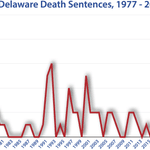
State & Federal
Delaware

History of the Death Penalty
The death penalty began in Delaware in 1662 with the state’s first hanging. The official method of execution for Delaware was hanging until 1986, when lethal injection became the new official method, with the exception of those already sentenced to death by hanging. The gallows were disassembled in 2003 when there was no longer a chance of an inmate choosing death by hanging. The legislative stance on the death penalty has changed over time, with the state repealing and reinstating the death penalty prior to the federal repeal and reinstatement. In August 2016, the Delaware Supreme Court declared provisions in the state’s death-penalty statute unconstitutional and directed that the prisoners on the state’s death row be resentenced to life without parole. Several legislative attempts to reintroduce the death penalty have failed. Prior to its abolition of the death penalty, Delaware had one of the highest per capita execution rates in the U.S.
Timeline
1662 – First known execution in Delaware, an unknown person is hung for attempted murder.
1731 – Catherine Bevan burned alive for the murder of her husband.
1958 – Delaware becomes the second state to abolish the death penalty.
1961 – The Delaware legislature overrides the governor’s veto, reinstating the death penalty.
1972 – The Supreme Court strikes down the death penalty in Furman v. Georgia.
1973 – The Delaware Supreme Court finds the state death penalty law unconstitutional under Furman.
1974 – The Delaware legislature passes a new capital punishment law making the death penalty mandatory for first-degree murder.
1976 – The Supreme Court reinstates the death penalty in Gregg v. Georgia.
1977 – Delaware rewrites its capital punishment statute to conform to Woodson v. North Carolina, a case prohibiting mandatory death sentences.
1986 – Lethal injection replaces hanging, although persons sentenced before this date can still choose to be hung. The sentence is carried out in a mobile trailer.
1991 – Public outcry after a hung jury sentenced four defendants to life without parole leads state legislators to grant the ultimate sentencing authority to judges in capital cases.
1992 – First post-Gregg execution in the state, Steven Pennel dies by lethal injection.
1996 – Billy Bailey chooses to be executed by hanging, is the last person executed using this method in Delaware.
2002 – In response to the Supreme Court’s decision in Ring v. Arizona, Delaware changes its capital punishment law to require juries to find whether the defendant is eligible for the death penalty.
2003 – Delaware gallows are taken down.
2012 – Delaware Governor Jack Markell grants clemency to death row inmate Robert Gattis, the first death penalty clemency in state history.
2016 — Delaware Supreme Court strikes down the state’s death sentencing statute, leaving the state with no valid way to impose death sentences. (See below for additional details.)
Famous Cases
Billy Bailey was the last inmate to be executed by hanging in Delaware and was the third inmate hung in the United States since 1976. Bailey was convicted in 1980 for the murder of an elderly couple, Gilbert and Clara Lambertson. He was given the choice between death by lethal injection, the new option for death row inmates, or the hanging to which he was originally sentenced. He claimed he did not want to be treated “like a dog put to sleep,” so he was hung on January 25, 1996. This was the last time the two-story gallows would be used in Delaware, as they were disassembled in 2003.
Robert Jackson was executed on July 29, 2011 for the murder of Elizabeth Girardi, who was hacked to death with an ax in 1992 when she came home and saw robbers trying to flee her house. Jackson was 18 years old at the time of the murder and spent 18 years on death row. He appealed the use of new anesthetic, pentobarbital, but was unsuccessful in his appeal. This new anestheic is now being widely used due to the national shortage of sodium thiopental. Jackson claimed he was innocent until his execution when he implied that his accomplice in the robbery, Anthony Lachette, was the individual responsible for the death of Girardi. Lachette was released from prison in 1996 after serving his sentence from pleading guilty to conspiracy and burglary.
Isaiah McCoy was exonerated on January 19, 2017, when Kent County Superior Court Judge Robert B. Young acquitted him of all charges in a retrial ordered by the Delaware Supreme Court. McCoy had been convicted and sentenced to death in 2012, but the Court overturned his conviction in 2015 as a result of prosecutorial misconduct in which the trial prosecutor, Deputy Attorney General R. David Favata belittled McCoy in front of the jury for choosing to represent himself, made intimidating comments to McCoy during a break in proceedings, then lied to the judge about having made those comments. Upon his release, McCoy said, “I just want to say to all those out there going through the same thing I’m going through ‘keep faith, keep fighting.’ Two years ago, I was on death row. At 25, I was given a death sentence – and I am today alive and well and kicking and a free man.”
Milestones in Abolition/Reinstatement
On April 2, 1958, the death penalty was outlawed when Governor Boggs signed a law that prohibited the sentence in capital cases. This was short-lived since the Delaware Legislature passed a bill, overturning the previous bill, to reinstate the death penalty. The death penalty was reinstated on December 18, 1961, overriding the veto of Governor Carvel.
In the 2015 – 2016 legislative session, Governor Markell announced that he would sign an abolition bill if it passed the legislature. The bill passed the state senate in April 2015 and was released by the House Judiciary Committee in January 2016 for consideration by the full House, where it failed to win approval. The House tabled reconsideration of its vote pending the outcome of a court case, Rauf v. State, challenging the constitutionality of the state’s capital sentencing procedures. On August 2, 2016, in Rauf, the Delaware Supreme Court ruled that the statute violated capital defendants’ right to a jury trial by allowing the judge, rather than the jury, to determine whether the prosecution had proven all the facts necessary to impose a death sentence and by permitting death sentences to be imposed without a unanimous jury vote that aggravating circumstances (reasons for death) outweighed mitigating circumstances (reasons for life) beyond a reasonable doubt. On August 15, the Attorney General announced he would not appeal the decision. Subsequently, on December 15, 2016, the court ruled in Powell v. State that its ruling in Rauf applied the to the 13 remaining prisoners on the state’s death row.
Other Interesting Facts
A Senate bill passed in 1994 requires that all executions take place between 12:01 AM and 3:00 AM.
Delaware has granted only one clemency to a death row inmate since the reinstatement of the death penalty. Robert Gattis was granted clemency on January 17, 2012.

Resources

Delaware Execution Totals Since 1976
News & Developments
News
Jun 04, 2025
2025 Roundup of Death Penalty Related Legislation
More than one hundred bills have been introduced this year in 34 states and in Congress to expand and limit use of the death penalty, abolish and reinstate the death penalty, modify execution protocols and secret the information about them, and alter aspects of capital trials. Thus far, nine bills in five states have been enacted, with Florida enacting the most legislation. Of the bills that have been signed into law, three modify execution protocols; two expand…
Read MoreNews
Oct 07, 2024
Delaware Officially Removes Death Penalty from State Statutes Eight Years After State Supreme Court Finds It Unconstitutional
On September 26, 2024, Governor John Carney (D) signed House Bill 70, which officially repeals the death penalty from the state’s law. Although Delaware’s Supreme Court found its death penalty statute to be unconstitutional in 2016, invalidating it for future use and effectively abolishing capital punishment, the passage of HB 70 amends Title 11 of the state’s code to remove the death penalty and replace it with life without parole as the most severe punishment for…
Read MoreNews
Mar 13, 2020
DPIC Analysis: Exoneration Data Suggests Non-Unanimous Death-Sentencing Statutes Heighten Risk of Wrongful Convictions
Capital sentencing schemes that permit judges to impose a death sentence despite the votes of one or more jurors for life create a heightened risk that an innocent person will be wrongfully convicted and sentenced to death, according to a new Death Penalty Information Center analysis of death-row exoneration…
Read MoreNews
Dec 30, 2019
Law Review: New Article Highlights Decline of Judicial Death Sentences
At least 99 men and one woman are on death row in eight U.S. states, condemned to death by judges without the prior authorization of a jury, according to a 2019 study by researchers Michael Radelet and Ben Cohen (pictured) published in the Annual Review of Law and Social Science. Another 18 prisoners sentenced to death since the resumption of capital punishment in the U.S. in the 1970s, the study shows, have been executed after…
Read MoreNews
Jan 12, 2018
Experience Shows No “Parade of Horribles” Following Abolition of the Death Penalty
States that have recently abolished the death penalty have not experienced the“parade of horribles” — including increased murder rates — predicted by death-penalty proponents, according to death-penalty experts who participated in a panel discussion at the 2017 American Bar Association national meeting in New York City. Instead, the panelists said, abolition appears to have created opportunities to move forward with other broader…
Read More


